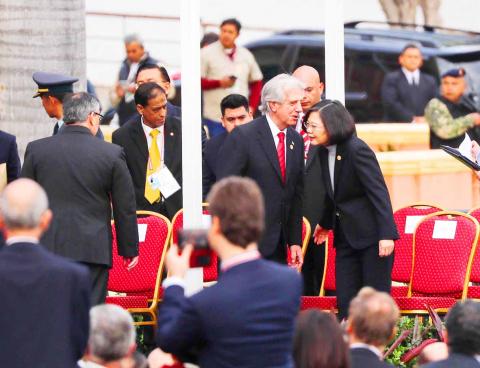Uruguay’s decision to halt visa-free entry for Taiwanese from Wednesday was due to pressure from Beijing, a source said yesterday.
The announcement by Uruguay, which ended diplomatic ties with Taiwan in 1988, was unexpected, the source said.
Chinese General Administration of Customs Minister Ni Yue-feng (倪岳峰) on Monday visited Uruguay, where he reportedly met with Uruguayan Minister of Foreign Affairs Rodolfo Nin Novoa as the two nations celebrated the 30th anniversary of formal diplomatic ties, the source said.

Photo: CNA
However, the Ministry of Foreign Affairs in Taipei yesterday cited technical issues for Uruguay’s decision.
Uruguay halted the preferential treatment for Taiwanese because its online e-visa application system is still being developed, the ministry said.
Until further notice, Taiwanese would have to apply for a visa at the Uruguayan embassy in Japan, ministry spokesman Andrew Lee (李憲章) said.
The ministry said that it would continue to approach the Uruguayan government and strive to have the relevant procedures completed as soon as possible so that Taiwanese could again enjoy the convenience of visa-free entry into Uruguay.
Uruguay began offering visa-free entry for up to 90 days on Oct. 19, making it the 169th nation at the time to offer Taiwanese preferential visa treatment.
The ministry had previously said that visa-free access was granted due to steps taken by the Taipei Commercial and Cultural Office in Argentina, which also handles Uruguayan affairs.
Additional reporting by CNA

PREPAREDNESS: Given the difficulty of importing ammunition during wartime, the Ministry of National Defense said it would prioritize ‘coproduction’ partnerships A newly formed unit of the Marine Corps tasked with land-based security operations has recently replaced its aging, domestically produced rifles with more advanced, US-made M4A1 rifles, a source said yesterday. The unnamed source familiar with the matter said the First Security Battalion of the Marine Corps’ Air Defense and Base Guard Group has replaced its older T65K2 rifles, which have been in service since the late 1980s, with the newly received M4A1s. The source did not say exactly when the upgrade took place or how many M4A1s were issued to the battalion. The confirmation came after Chinese-language media reported

The Taiwanese passport ranked 33rd in a global listing of passports by convenience this month, rising three places from last month’s ranking, but matching its position in January last year. The Henley Passport Index, an international ranking of passports by the number of designations its holder can travel to without a visa, showed that the Taiwan passport enables holders to travel to 139 countries and territories without a visa. Singapore’s passport was ranked the most powerful with visa-free access to 192 destinations out of 227, according to the index published on Tuesday by UK-based migration investment consultancy firm Henley and Partners. Japan’s and

A Ministry of Foreign Affairs official yesterday said that a delegation that visited China for an APEC meeting did not receive any kind of treatment that downgraded Taiwan’s sovereignty. Department of International Organizations Director-General Jonathan Sun (孫儉元) said that he and a group of ministry officials visited Shenzhen, China, to attend the APEC Informal Senior Officials’ Meeting last month. The trip went “smoothly and safely” for all Taiwanese delegates, as the Chinese side arranged the trip in accordance with long-standing practices, Sun said at the ministry’s weekly briefing. The Taiwanese group did not encounter any political suppression, he said. Sun made the remarks when

BROAD AGREEMENT: The two are nearing a trade deal to reduce Taiwan’s tariff to 15% and a commitment for TSMC to build five more fabs, a ‘New York Times’ report said Taiwan and the US have reached a broad consensus on a trade deal, the Executive Yuan’s Office of Trade Negotiations said yesterday, after a report said that Washington is set to reduce Taiwan’s tariff rate to 15 percent. The New York Times on Monday reported that the two nations are nearing a trade deal to reduce Taiwan’s tariff rate to 15 percent and commit Taiwan Semiconductor Manufacturing Co (TSMC, 台積電) to building at least five more facilities in the US. “The agreement, which has been under negotiation for months, is being legally scrubbed and could be announced this month,” the paper said,